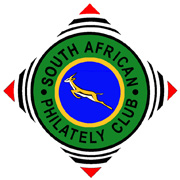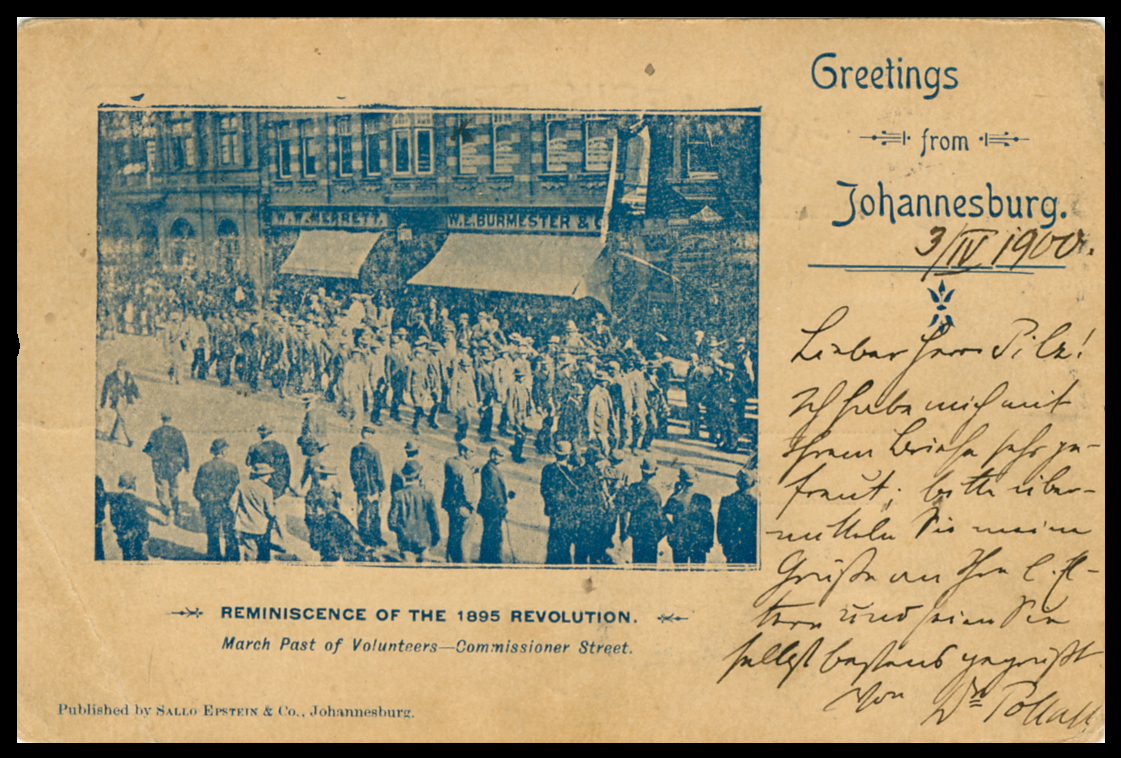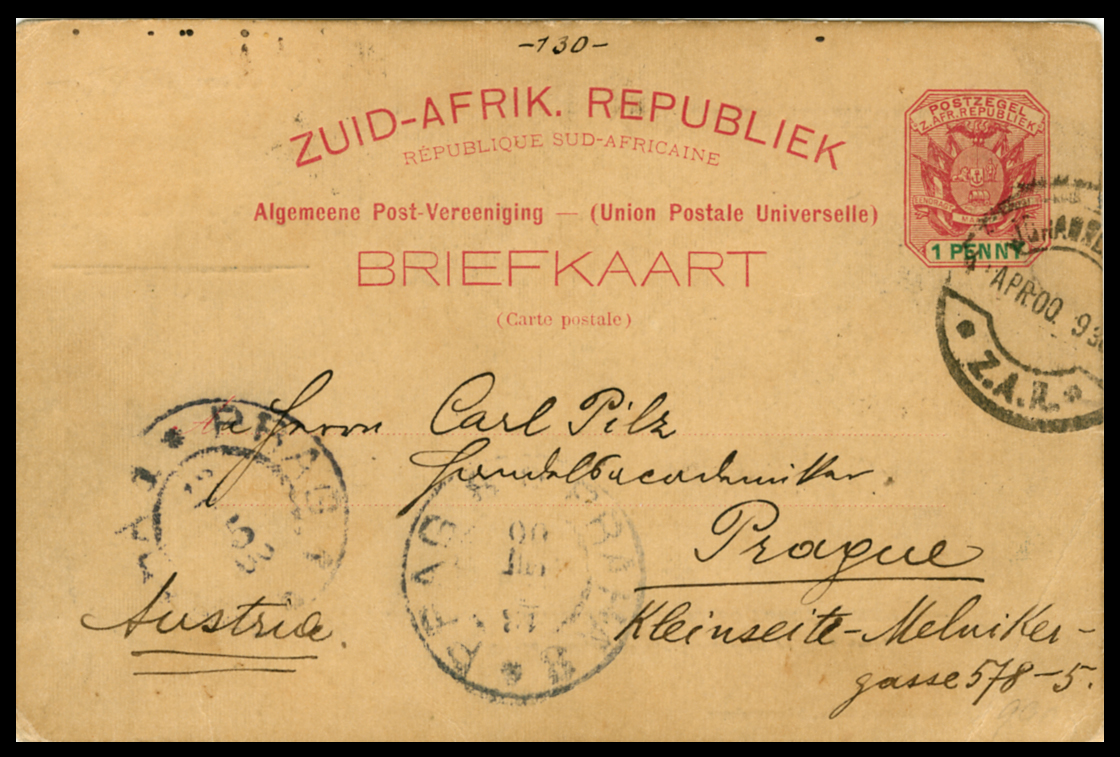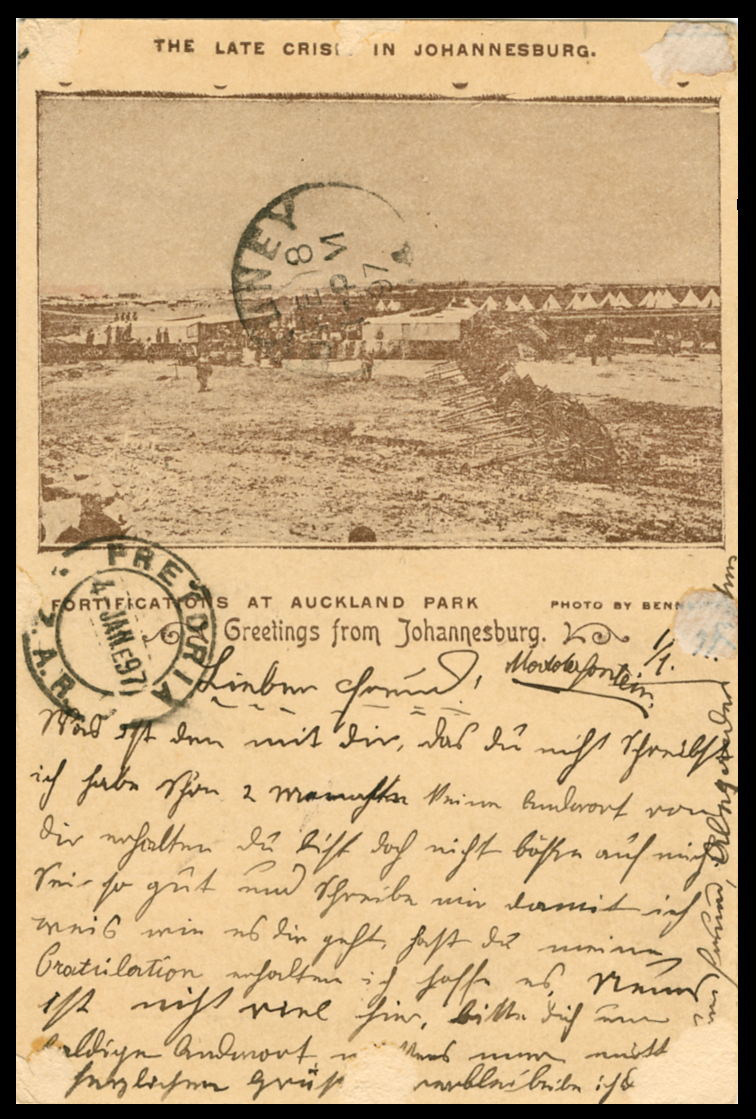ZAR: W. E. Burmester of Pretoria and Johannesburg
Quote from Steve on October 31, 2022, 10:05 amI recently rediscovered the postcard below. Written on '3/IV/1900' and datestamped JOHANNESBURG '4 APR 00' on reverse, it is entitled 'Reminiscence of the 1895 Revolution - March Past of Volunteers - Commissioner Street'. It is thought the marching men are Irishmen showing their support for the Boers against the Uitlanders / British. Many of these marching men would serve under Major John McBride in the 'Irish Brigade' during the South African War.
Prominent behind the marching men is the Johannesburg store of W. E. Burmester. This shop reminded me of something that had occurred a few years earlier when we started the SA Philately Club at the start of the Covid pandemic. On 11 May 2020, I emailed the editor of the Transvaal Philatelist bringing to his attention what I regarded as an error in an article it had printed. I wrote:
"Further to the article, 'On the Record - Printed by W. E. Burmester & Co., Printers, Bookbinders and Rulers', that appears in the Transvaal Philatelist v.54, no.3, (204), November 2019, the writer of the article suggests that W E Burmester of Pretoria and Johannesburg was a part of Burmester & Co., in Cape Town.
I refer to the comment that "a matching envelope.... posted with a cheque during August 1891 to their store in Cape Town". There was no formal association between these two companies other than a shared surname. They were separate legal commercial entities in their own right, one in the COGH and the other in the ZAR. The TP is reading too much into a simple commercial transaction between two company's that shared the same surname. There is no proof for your statement that E Burmester was " their store in Cape Town".
Should you wish to know more about Burmester & Co. in Cape Town, I refer you to the definitive history of E BURMESTER & CO. See Robin Pelteret's excellent biography of the company. It has no references to a branch or head office in the ZAR, nor a W E Burmester as a relation, employee, director or shareholder." I referred them to the following:
I received a reply from Tim Harrison who wrote: "Thanks for your comment. I'll raise it with the author and we may want to include it and any subsequent discussion in the next edition of TP." I heard no more about it. Not being a subscriber to the Transvaal Philatelist, I do not know if a correction appeared in print or not. I vaguely recall an email which I cannot find with the previous editor, (not Tim Harrison), in which he said the issue would be raised at the next committee meeting (or some such) which would not be for another year! (This had caused great merriment as one reason for starting the SAPC was to get around time-wasting committee meetings.)
All of this drifted and I forgot about it until I rediscovered the postcard below. It reminded me that this matter had not been closed to my satisfaction. I wondered what had happened if anything. The comment about E Burmester in Cape Town being a subsidiary of W E Burmester had struck me as a typically ignorant form of Jo'burg arrogance, the inhabitants of that over-grown mining town always assuming commercial superiority in all things South African. The Capey in me, sunbathing on the beach at noon, rose to the bait.
Interestingly, the W. E. Burmester postcard is dated JOHANNESBURG '4 APR 00', some two months before the British Army occupied Johannesburg during the South African War. Both postcards commemorate 'The Jameson Raid' of 1895/96. The second card showing the camp and fortifications constructed at Auckland Park is addressed to Sydney, New South Wales, (not Australia). Curiously, the Irish Brigade was commemmorated with a statue in Auckland Park in 1975 opened by Mrs Betsie Verwoerd, wife of the assassinated Prime Minister. John MacBride for his part spontaneously volunteered to assist the 1916 Uprising and was executed in Kilmainham gaol.
I recently rediscovered the postcard below. Written on '3/IV/1900' and datestamped JOHANNESBURG '4 APR 00' on reverse, it is entitled 'Reminiscence of the 1895 Revolution - March Past of Volunteers - Commissioner Street'. It is thought the marching men are Irishmen showing their support for the Boers against the Uitlanders / British. Many of these marching men would serve under Major John McBride in the 'Irish Brigade' during the South African War.
Prominent behind the marching men is the Johannesburg store of W. E. Burmester. This shop reminded me of something that had occurred a few years earlier when we started the SA Philately Club at the start of the Covid pandemic. On 11 May 2020, I emailed the editor of the Transvaal Philatelist bringing to his attention what I regarded as an error in an article it had printed. I wrote:
"Further to the article, 'On the Record - Printed by W. E. Burmester & Co., Printers, Bookbinders and Rulers', that appears in the Transvaal Philatelist v.54, no.3, (204), November 2019, the writer of the article suggests that W E Burmester of Pretoria and Johannesburg was a part of Burmester & Co., in Cape Town.
I refer to the comment that "a matching envelope.... posted with a cheque during August 1891 to their store in Cape Town". There was no formal association between these two companies other than a shared surname. They were separate legal commercial entities in their own right, one in the COGH and the other in the ZAR. The TP is reading too much into a simple commercial transaction between two company's that shared the same surname. There is no proof for your statement that E Burmester was " their store in Cape Town".
Should you wish to know more about Burmester & Co. in Cape Town, I refer you to the definitive history of E BURMESTER & CO. See Robin Pelteret's excellent biography of the company. It has no references to a branch or head office in the ZAR, nor a W E Burmester as a relation, employee, director or shareholder." I referred them to the following:
I received a reply from Tim Harrison who wrote: "Thanks for your comment. I'll raise it with the author and we may want to include it and any subsequent discussion in the next edition of TP." I heard no more about it. Not being a subscriber to the Transvaal Philatelist, I do not know if a correction appeared in print or not. I vaguely recall an email which I cannot find with the previous editor, (not Tim Harrison), in which he said the issue would be raised at the next committee meeting (or some such) which would not be for another year! (This had caused great merriment as one reason for starting the SAPC was to get around time-wasting committee meetings.)
All of this drifted and I forgot about it until I rediscovered the postcard below. It reminded me that this matter had not been closed to my satisfaction. I wondered what had happened if anything. The comment about E Burmester in Cape Town being a subsidiary of W E Burmester had struck me as a typically ignorant form of Jo'burg arrogance, the inhabitants of that over-grown mining town always assuming commercial superiority in all things South African. The Capey in me, sunbathing on the beach at noon, rose to the bait.
Interestingly, the W. E. Burmester postcard is dated JOHANNESBURG '4 APR 00', some two months before the British Army occupied Johannesburg during the South African War. Both postcards commemorate 'The Jameson Raid' of 1895/96. The second card showing the camp and fortifications constructed at Auckland Park is addressed to Sydney, New South Wales, (not Australia). Curiously, the Irish Brigade was commemmorated with a statue in Auckland Park in 1975 opened by Mrs Betsie Verwoerd, wife of the assassinated Prime Minister. John MacBride for his part spontaneously volunteered to assist the 1916 Uprising and was executed in Kilmainham gaol.
Uploaded files:Quote from Steve on March 29, 2023, 11:07 am29th March 2023. Still no reply.
One of the causes of the South African War was the jingoistic and imperial arrogance of Anglo-Transvaalers, 'Uitlanders' by another name. Their pervasive sense of superiority persisted throughout the 20th Century as snobisme toward anyone and anything outside the money-based culture of Johannesburg. 'Transvaal' was their name for the ZAR. This hubris appears to still exist within the Transvaal Philatelist where the belief is that any Cape business with the same name as a Transvaal / Gauteng one absolutely has to be a subsidiary of the Transvaal company. This assumption (ass-u-me) printed in Transvaal Philatelist is wrong. E. Burmester in Cape Town was in existence long before any Transvaal company of the same surname jumped on the gold train to Superiority Central. I do not pay for the Transvaal Philatelist so if they have posted a correction I apologise. But I don't think it has. The editor certainly hasn't written to me stating that the magazine got it wrong! Perhaps he tried to call me but I was out. I have always thought - and still do - that it is more rewarding to work on one's tan on a Cape beach during the working day than labour in a hole!
29th March 2023. Still no reply.
One of the causes of the South African War was the jingoistic and imperial arrogance of Anglo-Transvaalers, 'Uitlanders' by another name. Their pervasive sense of superiority persisted throughout the 20th Century as snobisme toward anyone and anything outside the money-based culture of Johannesburg. 'Transvaal' was their name for the ZAR. This hubris appears to still exist within the Transvaal Philatelist where the belief is that any Cape business with the same name as a Transvaal / Gauteng one absolutely has to be a subsidiary of the Transvaal company. This assumption (ass-u-me) printed in Transvaal Philatelist is wrong. E. Burmester in Cape Town was in existence long before any Transvaal company of the same surname jumped on the gold train to Superiority Central. I do not pay for the Transvaal Philatelist so if they have posted a correction I apologise. But I don't think it has. The editor certainly hasn't written to me stating that the magazine got it wrong! Perhaps he tried to call me but I was out. I have always thought - and still do - that it is more rewarding to work on one's tan on a Cape beach during the working day than labour in a hole!
Quote from Steve on April 18, 2023, 10:38 amStill no reply from the Transvaal Philatelist. It's unsurprising. Most English-speaking people from Johannesburg were condescending in their attitudes to other South Africans. (That's being extremely polite!) No doubt, their patronising sense of superiority contributed mightily to making them too proud to admit when they are wrong. For the record, the article in the Transvaal Philatelist is wrong. The company E Burmester in Cape Town pre-existed the discovery of diamonds and gold and was never a subsidiary of W E Burmester of Johannesburg and Pretoria.
Following on from the arrogance that allows such assumptive bull to be stated without question or a reply, the term 'Anglo-Boer War' grew out of the same sense of racial superiority that the English-speaking Uitlander class' displayed against Boers and Blacks. Having fouled Boer-Brit relations for generations - where have the English left a conquered people happier? - the returning British Transvaalers chose to call their war the 'Anglo-Boer War', a reference to the sons of Empire, (Welsh, Scots, Irish, all unhappy with England today; the sad Australians, Canadians, New Zealanders, less so), coming to their sorry rescue in a war that conveniently excluded Black South Africans.
Its 3pm. The south-easter is blowing. I'm off to Clifton. Where's my beach towel and my Speedos?
Still no reply from the Transvaal Philatelist. It's unsurprising. Most English-speaking people from Johannesburg were condescending in their attitudes to other South Africans. (That's being extremely polite!) No doubt, their patronising sense of superiority contributed mightily to making them too proud to admit when they are wrong. For the record, the article in the Transvaal Philatelist is wrong. The company E Burmester in Cape Town pre-existed the discovery of diamonds and gold and was never a subsidiary of W E Burmester of Johannesburg and Pretoria.
Following on from the arrogance that allows such assumptive bull to be stated without question or a reply, the term 'Anglo-Boer War' grew out of the same sense of racial superiority that the English-speaking Uitlander class' displayed against Boers and Blacks. Having fouled Boer-Brit relations for generations - where have the English left a conquered people happier? - the returning British Transvaalers chose to call their war the 'Anglo-Boer War', a reference to the sons of Empire, (Welsh, Scots, Irish, all unhappy with England today; the sad Australians, Canadians, New Zealanders, less so), coming to their sorry rescue in a war that conveniently excluded Black South Africans.
Its 3pm. The south-easter is blowing. I'm off to Clifton. Where's my beach towel and my Speedos?



